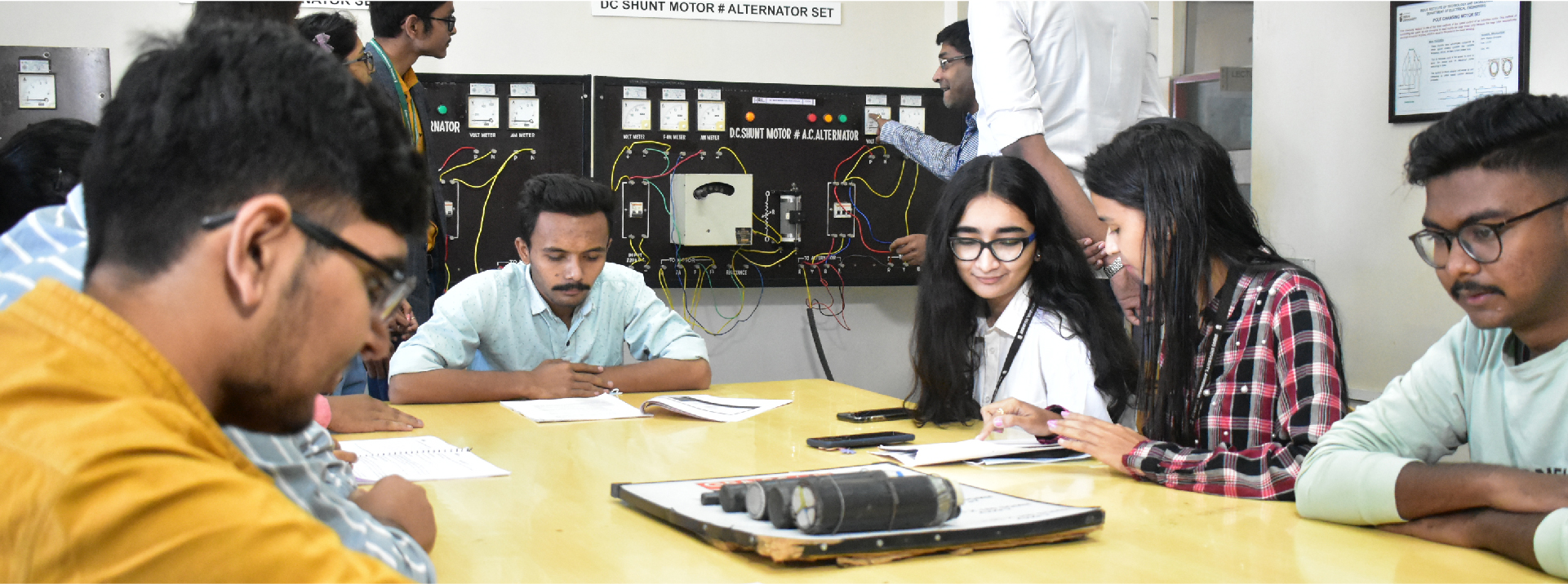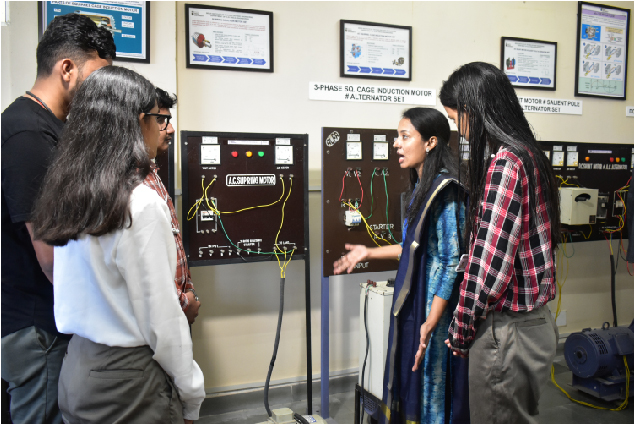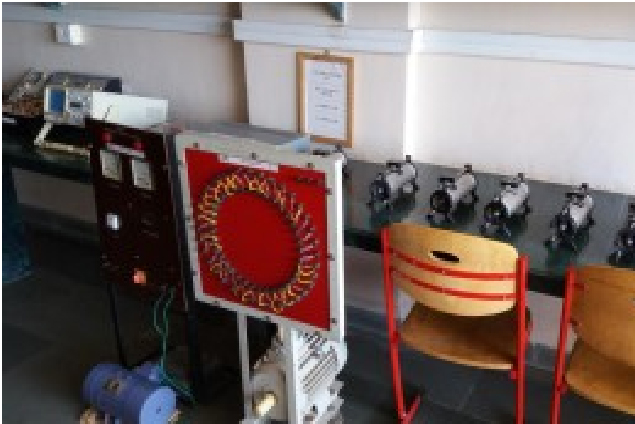Announcement
Get Ready for INDUS CUP 2K26! | Dates: 5–10 January 2026 | Stand a Chance to Win Cash Prizes up to ₹10,00,000!...Read more Get Ready for INDUS CUP 2K26! | Dates: 5–10 January 2026 | Stand a Chance to Win Cash Prizes up to ₹10,00,000!
We are excited to announce the Indus Hackathon 2025, an exhilarating one-day event organized by the CSE Department of Indus University....Read more We are excited to announce the Indus Hackathon 2025, an exhilarating one-day event organized by the CSE Department of Indus University.
26th ISTE Faculty Annual State Convention will be held at Indus University on April 27, 2023....Read more 26th ISTE Faculty Annual State Convention will be held at Indus University on April 27, 2023.
Get Ready for INDUS CUP 2K26! | Dates: 5–10 January 2026 | Stand a Chance to Win Cash Prizes up to ₹10,00,000!...Read more Get Ready for INDUS CUP 2K26! | Dates: 5–10 January 2026 | Stand a Chance to Win Cash Prizes up to ₹10,00,000!
We are excited to announce the Indus Hackathon 2025, an exhilarating one-day event organized by the CSE Department of Indus University....Read more We are excited to announce the Indus Hackathon 2025, an exhilarating one-day event organized by the CSE Department of Indus University.
26th ISTE Faculty Annual State Convention will be held at Indus University on April 27, 2023....Read more 26th ISTE Faculty Annual State Convention will be held at Indus University on April 27, 2023.

In the 21st century, our world is increasingly becoming electric and digital. The energy transition, e-mobility, autonomous driving, and Industry 4.0 are driving a high demand for electrical engineers. To sustain planned growth in the power sector, the industry needs human capital trained in Electrical Engineering.
The Electrical Engineering Department contributes to this need by producing trained technology leaders. Electrical engineering is an exciting and dynamic field. Electrical engineers are in demand as they are responsible for generating, transmitting, and converting electrical power.
The Electrical Engineering Department of Indus University was established in 2012 and is currently one of the premier engineering colleges in Gujarat. The department offers the following courses: a Ph.D. program, M.Tech in Electric Power Systems, and B.Tech in Electrical Engineering.
Students interested in studying at Indus Institute of Technology and Engineering for a BTech in Electrical Engineering must complete their 10+2 education in the science stream with core subjects such as Physics, Chemistry, Mathematics, and Computer Science.
The department boasts highly qualified and experienced faculty members who provide the best quality education and knowledge to our students. The syllabus of the courses offered by the Department of Electrical Engineering is tailor-made to meet industry needs, ensuring students are industry-ready professionals.
The syllabus includes subjects related to the latest trends and technologies such as high-speed trains, electric hybrid vehicles, Renewable Energy Systems, Python programming, Environmental Science, Indian Science & Technology, etc.
The Indus Institute of Technology and Engineering's B.Tech in Electrical Engineering course offers excellent opportunities for students to gain genuine and practical knowledge of one of the world's leading subjects, electricity.
The B.Tech Electrical Engineering course opens up promising career opportunities for students in the future. Students can pursue careers as mechanical engineers, maintenance engineers, etc.
The curriculum of the Indus Institute of Technology and Engineering's B.Tech Electrical Engineering program includes programming, economics, electronics, mechanics, mathematics, chemistry, etc. Students are required to study all these subjects with equal focus alongside their majors, diversifying their knowledge. As an electrical engineer, you are therefore eligible to apply for jobs in IT, electronics, or any other engineering field, as the course provides you with an essential understanding of everything.
Electrical engineering students can easily find jobs in hospitals, educational institutions, multinational companies, banks, and other fields of electrical engineering.
Our Diploma in Electrical Engineering program is designed to give you all the essential skills you need for a successful career in this field. With hands-on learning and experienced teachers, you'll get a solid foundation in electrical engineering principles. Whether you dream of working in power, electronics, or telecommunications, our program prepares you for a bright future.
Some of the top sectors that hire Electrical Engineers include:
Our Diploma in Electrical Engineering program is designed to provide you with all the essential skills you need for a successful career in this field. With hands-on learning and experienced teachers, you'll also gain a solid foundation in electrical engineering principles. Whether you aspire to work in power, electronics, or telecommunications, our program equips you for a bright and successful future.
The Admission Committee for Professional Courses (ACPC) will admit students based on merit on 50% of the sanctioned strength for each course. The student needs to register himself with ACPC after the result.
50% seats of the sanctioned strength of each course are Management Quota, admission of which is handled by the institute as per guidelines of ACPC.
Minimum Aggregate 45% in Physics, Chemistry & Mathematics, Theory exam in H.S.C. of any boards.
Course Duration
4 Years (8 Semesters)
Engineering proficiency: To tackle complicated engineering problems, utilize your knowledge of mathematics, science, engineering fundamentals, and an engineering speciality.
Analysis: Using the fundamental concepts of mathematics, the natural sciences, and engineering, formulate, identify, assess research writings, and analyze complex engineering challenges to obtain validated conclusions.
Design & development solutions: Consider safety hazards, cultural and environmental considerations, and design solutions for challenging technical problems and system components or methodologies that adequately address the indicated needs.
Sustainability and Environment: Demonstrate an awareness of the impact of professional engineering solutions in societal and environmental contexts and the importance of long-lasting developments.
Individual and teamwork: Effectively perform independently, in varied groups, and in leadership roles in multidisciplinary situations.
Communication: Communicate widely about challenging engineering tasks with the engineering community and the general public, for example, by comprehending and writing robust reports and design documentation to provide persuasive presentations and get precise instructions.
Project management: Apply engineering and management ideas to one's assignment as a team member and leader to work on projects and in multidisciplinary backgrounds, demonstrating detail and comprehension in both areas.
All laboratories are well-equipped with the latest & updated hardware and software instruments to support learning dissemination in the classroom and provide hands-on practical experience.
Various electrical A.C. & D.C. machines, such as single-phase and three-phase transformers, single-phase induction motors, various fractional horse-power motors, 3-phase induction motors, synchronous motors and alternators, D.C. generators, and D.C. motors, with multiple ratings, are included in this laboratory's study of electrical machines.
This lab has well-designed panels with contemporary simulation models for transmission lines, different switchgear, a PLC trainer with software, a panel for testing relays, and sophisticated programmable microprocessor-based relays. Feeder protection biassed differential protection of transformers and induction motor protection is some of the main power system protection panels. This lab includes a variety of Electrical Engineering applications, including MATLAB, MIPOWER, Lab VIEW, PSPICE, and others.
A variety of trainer kits are available in this lab for testing network and theorems. Various types of equipment for standard cells, potentiometers, dual-trace oscilloscopes, function generators, and other measuring devices are also included in this laboratory.
The Power Electronics & Devices lab uses a variety of devices (SCR, MOSFET, DIAC, TRIAC, IGBT) as well as thyristor control devices, half-wave and full-wave rectifier kits, DSO, CRO, power supply, and kits for characterizing these devices.
The Analog Electronics Laboratory is well-equipped with various analogue trainers to study the fundamental properties and uses of operational amplifiers, transistors, and diodes. In the lab, several experiments using oscillators and amplifier setups are conducted. Function generators, power supplies, digital multimeters, cathode ray oscilloscopes, and breadboards are examples of the many test and measurement tools available.
Students can gain practical experience with creating, programming, testing, and debugging processors and microcontrollers in the Microprocessor and Embedded System Laboratory. This lab uses a MATLAB system with microprocessors and microcontrollers to do software and hardware experiments.
Programming in assembly language, basic I/O interfaces, serial-parallel interfaces, and interrupt handling are all used in microprocessor and microcontroller systems. The hardware consists of training kits for the 8085, 8086, and 8051 microcontrollers and an ARM controller.
Electrical Engineering career prospects are expanding in India as it emerges as a global software powerhouse. The engineer's job in this field entails producing, distributing, and using electrical power, controlling it, and instrumentally processing data in communication, control systems, electronic computers, industrial electronics, and instrumentation, among other areas.
The Training & Placement Department (T & P Dept.) at Indus University has a separate team that bridges two essential ends: academia and industry. It demonstrates a link between educational institutions, university departments, and businesses.
The focal point for career counselling for university students pursuing studies in all programmes and streams is the Training & Placement Department (T & P Dept.). It provides students with comprehensive career options by assisting them in choosing and pursuing their ideal vocations.
The Admission Committee for Professional Courses (ACPC) will admit students based on merit on 50% of the sanctioned strength for each course. The student needs to register himself with ACPC after the result.
50% seats of the sanctioned strength of each course are Management Quota, admission of which is handled by the institute as per guidelines of ACPC.
Minimum Aggregate 45% in Physics, Chemistry & Mathematics, Theory exam in H.S.C. of any boards.
Course Duration
4 Years (8 Semesters)
Engineering proficiency: To tackle complicated engineering problems, utilize your knowledge of mathematics, science, engineering fundamentals, and an engineering speciality.
Analysis: Using the fundamental concepts of mathematics, the natural sciences, and engineering, formulate, identify, assess research writings, and analyze complex engineering challenges to obtain validated conclusions.
Design & development solutions: Consider safety hazards, cultural and environmental considerations, and design solutions for challenging technical problems and system components or methodologies that adequately address the indicated needs.
Sustainability and Environment: Demonstrate an awareness of the impact of professional engineering solutions in societal and environmental contexts and the importance of long-lasting developments.
Individual and teamwork: Effectively perform independently, in varied groups, and in leadership roles in multidisciplinary situations.
Communication: Communicate widely about challenging engineering tasks with the engineering community and the general public, for example, by comprehending and writing robust reports and design documentation to provide persuasive presentations and get precise instructions.
Project management: Apply engineering and management ideas to one's assignment as a team member and leader to work on projects and in multidisciplinary backgrounds, demonstrating detail and comprehension in both areas.
All laboratories are well-equipped with the latest & updated hardware and software instruments to support learning dissemination in the classroom and provide hands-on practical experience.
Various electrical A.C. & D.C. machines, such as single-phase and three-phase transformers, single-phase induction motors, various fractional horse-power motors, 3-phase induction motors, synchronous motors and alternators, D.C. generators, and D.C. motors, with multiple ratings, are included in this laboratory's study of electrical machines.
This lab has well-designed panels with contemporary simulation models for transmission lines, different switchgear, a PLC trainer with software, a panel for testing relays, and sophisticated programmable microprocessor-based relays. Feeder protection biassed differential protection of transformers and induction motor protection is some of the main power system protection panels. This lab includes a variety of Electrical Engineering applications, including MATLAB, MIPOWER, Lab VIEW, PSPICE, and others.
A variety of trainer kits are available in this lab for testing network and theorems. Various types of equipment for standard cells, potentiometers, dual-trace oscilloscopes, function generators, and other measuring devices are also included in this laboratory.
The Power Electronics & Devices lab uses a variety of devices (SCR, MOSFET, DIAC, TRIAC, IGBT) as well as thyristor control devices, half-wave and full-wave rectifier kits, DSO, CRO, power supply, and kits for characterizing these devices.
The Analog Electronics Laboratory is well-equipped with various analogue trainers to study the fundamental properties and uses of operational amplifiers, transistors, and diodes. In the lab, several experiments using oscillators and amplifier setups are conducted. Function generators, power supplies, digital multimeters, cathode ray oscilloscopes, and breadboards are examples of the many test and measurement tools available.
Students can gain practical experience with creating, programming, testing, and debugging processors and microcontrollers in the Microprocessor and Embedded System Laboratory. This lab uses a MATLAB system with microprocessors and microcontrollers to do software and hardware experiments.
Programming in assembly language, basic I/O interfaces, serial-parallel interfaces, and interrupt handling are all used in microprocessor and microcontroller systems. The hardware consists of training kits for the 8085, 8086, and 8051 microcontrollers and an ARM controller.
Electrical Engineering career prospects are expanding in India as it emerges as a global software powerhouse. The engineer's job in this field entails producing, distributing, and using electrical power, controlling it, and instrumentally processing data in communication, control systems, electronic computers, industrial electronics, and instrumentation, among other areas.
The Training & Placement Department (T & P Dept.) at Indus University has a separate team that bridges two essential ends: academia and industry. It demonstrates a link between educational institutions, university departments, and businesses.
The focal point for career counselling for university students pursuing studies in all programmes and streams is the Training & Placement Department (T & P Dept.). It provides students with comprehensive career options by assisting them in choosing and pursuing their ideal vocations.

An imaginative educational plan of this program will empower understudies..

An imaginative educational plan of this program will empower understudies..